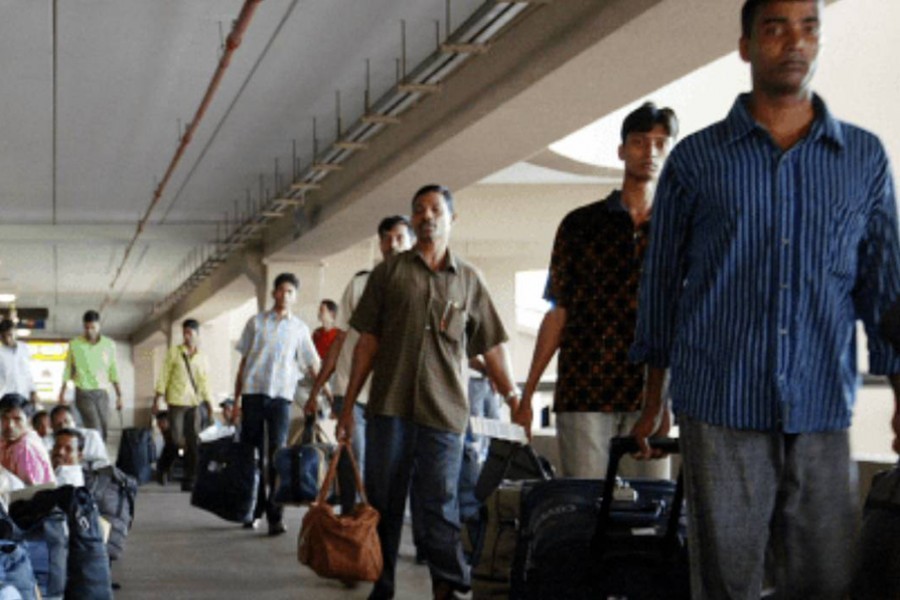The plight of the people taking illegal routes to secure jobs abroad does not need any elaboration.
Hundreds have so far died in extreme conditions while trying to sneak into countries in the Middle East, Southeast Asia, Europe and North America illegally. Many of them have perished inside containers while being transported by human traffickers. Others died in deserts and seas, mainly the Mediterranean.
Until last Thursday, none, however, was murdered while being transported by the traffickers. But, that ghastly event did also take place Thursday when a group of armed abductors in the war-torn Libya opened fire on a group of migrant workers. Not one or two. At least 26 Bangladesh nationals died and 11 more received gun shots when they failed to pay the abductors cash money as ransom.
A total of 38 Bangladesh nationals, reportedly, left the country for Italy nearly six months back. They had reached Benghazi via India, the UAE and Egypt in December. They were supposed to land in Italy using the Mediterranean route. But as the factional war in Libya intensified and the deadly COVID-19 pandemic got hold of most European countries including Italy, the traffickers' plan suffered a huge setback.
The migrant workers under the guidance of the traffickers started for Tripoli from Benghazi using a difficult desert route, but they were abducted by a local armed group. Following payment of ransom, they were freed. On May 21 last they along with some nationals of Sudan were abducted again by another armed group. As they failed to pay ransom to the second group, the captors subjected the illegal job-seekers to inhuman torture. At this stage some Bangladeshis and Sudan nationals joined hands and killed two of the captors, including their leader. In retaliation, the abductors gunned down 30 Bangladeshis and Sudanese workers. Eleven Bangladeshis were also critically injured.
The May 31 issue of a section of newspapers carried pictures of the wailing relatives of the victims, mainly coming from rural areas of the country. Such pictures are, however, published on one or two occasions every year. The people are quite familiar with such tragedies.
The illegal migration is a risky affair and it involves payment of substantial amount of money to the so-called manpower agents. In the case of Libya, a job-seeker, reportedly, has to pay between Tk 0.7 and Tk 0.8 million and to reach Italy one has to spend another Tk 04-Tk 0.5 million each. In many instances, the job-seekers cannot reach their destination and return home empty-handed.
Following a directive issued by the higher court in 2015, none is officially allowed to go to Libya seeking employment. But that could not deter the desperate job-seekers from landing there with a goal of reaching the Italian coast. An estimated 20,000 Bangladeshis are now in conflict-ridden Libya.
International human traffickers do have their network in many countries. They are particularly interested in poor countries where job-seekers are mostly ignorant and unskilled and prone to walking into the trap easily.
Instances of cheating by manpower agents are many. A number of families have been pauperised by fraudulent agents. The affected families, however, try to recoup their loss by various means. But when cheating costs live, it becomes truly unbearable for the affected families.
A part of the blame goes to the job-seekers. In this age of information technology, news about fraudulent practices is always in circulation. Yet a section of people can be easily allured by the unscrupulous manpower recruiters, who are acting as agents of international human traffickers.
The government also has not been doing its part to check the fraudulent activities of a section of manpower recruiters. Its actions usually remain confined to scrapping licences when a recruiting agency is found guilty of wrongdoing. The recruiter concerned, however, does know the art of getting its licence revived.
When a manpower recruiting agency gets involved in acts like human trafficking or incidents that have taken innocent human lives, punishment needs to be severe. Even after so many tragic incidents involving poor job-seekers, no manpower agent has faced criminal charge of manslaughter until now. In fact, there has not been any thorough investigation in such incidents.
In the latest incident that has taken place in Libya, some locals must have been involved in sending 36 young men in such a risky venture. If properly investigated, it would not be difficult to locate those culprits and bring them to book. But that is unlikely to happen.
As everybody is now engrossed in developments surrounding the COVID-19 pandemic, the Libyan tragedy got little attention. Since movement of air traffic is now closed internationally and countries have kept their borders closed due to the pandemic, there is no outbound migration, legal or illegal. Once the situation becomes normal, outbound illegal movement of workers from this country is expected to resume. But because of the pandemic fallout, the environment in destination countries is likely to be very hostile.


